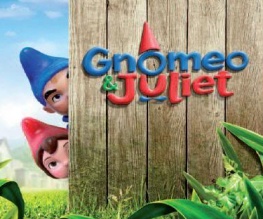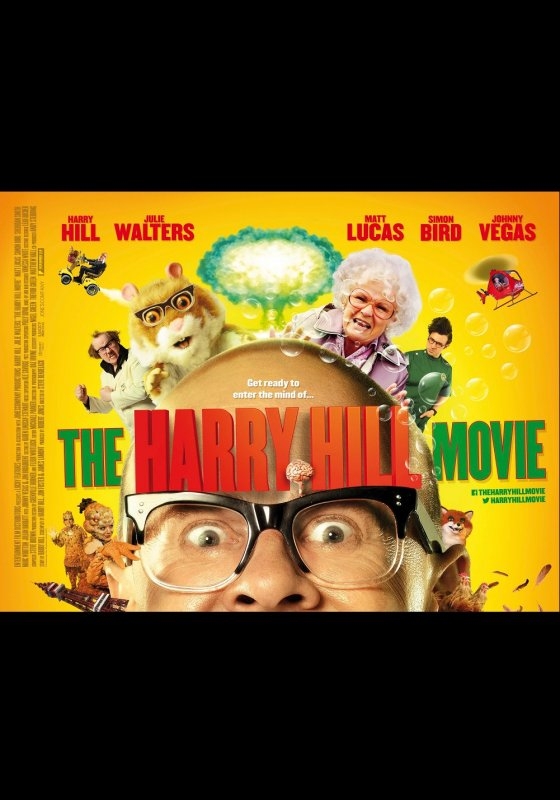Gnomeo and Juliet

According to Wikipedia, Romeo and Juliet “may be the most-screened play of all time”. We’re not arguing. The many and varied homages to Shakespeare’s tale of star-cross’d lovers range from the epic (Cukor, 1936) to the MTV-tastic (Luhrmann, 1996) via the underage-breastacular (Zeffirelli, 1968) – not forgetting Romeo Must Die, perhaps the only adaptation to recycle an NRA slogan. In many ways, all Hollywood has been doing is killing time until Ozzy Osbourne felt like voicing a concrete fawn.
[FLOWPLAYER=http://uk.image-1.filmtrailer.com/58971.jpg|http://uk.clip-1.filmtrailer.com/6190_19739_a_5.flv,275,180]
In Verona Drive, Mr Capulet (Richard Wilson) and Miss Montague (Julie Walters) are fighting a slow, grim war of attrition over the adjoining gardens of their gaudy semis. The weapons are garden ornaments, the tactics are decorative and the planning permission must take bloody hours. But unbeknownst to them, their collections of conveniently colour-coded gnomes are also locked in a bitter feud, helmed by Redcap chief Lord Redbrick (Michael Caine) and Bluecap leader Lady Bluebury (Maggie Smith). Yes, you read that right. Bluecap scion Gnomeo (McAvoy) likes nothing more than besting Redcap champion Tybalt (Jason Statham) in illicit lawnmower races, but when he inadvertently falls for Lord Redbrick’s only daughter (Blunt) his feelings risk getting in the way of the vendetta. Can Gnomeo and Juliet escape to an abandoned plot and begin their own garden in a world free from the prejudice they have always known, or will the colour of their stupid pointy hats prove too great a barrier? It’s as if Shakespeare died as a child…

There are lots of good things about Gnomeo and Juliet. The cast is obviously stellar (I haven’t even mentioned Patrick Stewart, have I?), the script has enough clever lines to neutralise its more stultifying moments and the overall tone is reminiscent of early non-crap Shrek, with plenty of Easter eggs for long-suffering parents – director Kelly Asbury was responsible for Shrek 2, and he’s lost none of his touch. I particularly enjoyed the stolen lines from Forrest Gump and Brokeback Mountain, and there’s at least one soothing pop-cultural reference (The Matrix? Check. American Beauty? Check.) for every time a Shakespeare line is viciously raped. It will, however, be many weeks before I forget Gnomeo’s parting shot before he heads off for a lawnmower race with Tybalt: “Red? I hate the word.” Wince.
The spirit of the original story is present throughout much of the film, which cleverly borrows from iconic adaptations as well as the text itself – keep an eye open for rip-off swimming pool moments – but things feel increasingly wobbly as we head into the final act with the absolute knowledge that the day is about to be saved in a frustratingly saccharine manner. I’m not so much of a misery as to wish the cutesy little gnomes dead, but there’s something about a contrived, inevitable happy ending that’s almost more depressing than a pair of teenagers committing suicide. And if there’s anything worse than that, it’s an hour and a half of instrumental Elton John. Jesus.

Elton has reportedly been involved with this project for a decade – both he and civil partner David Furnish are listed as producers – but his constant interruptions were unquestionably the worst thing about Gnomeo and Juliet (quite a pronouncement given that he’s up against, amongst other things, a lawnmower advert voiced by Hulk Hogan). Everyone likes a bit of Crocodile Rock, no argument there, but after the third action scene featuring a symphonic string rendition of the chorus from Saturday Night’s Alright for Fighting I wanted to reach through the screen and choke the glittery bastard on his big kooky glasses and terrific sense of entitlement. Elton’s strategy was evidently to take a reasonable (if kitsch) idea and then ram it down the audience’s throats until they’re not sure if they enjoyed it or they want to die – and as with soundtracks, it seems, so with films.





Recent Comments